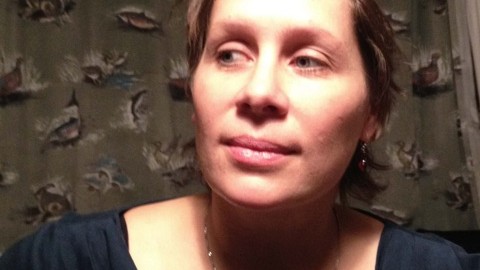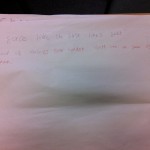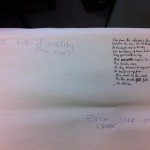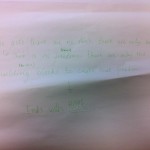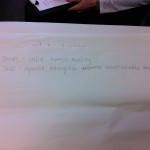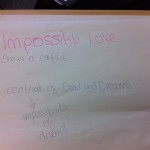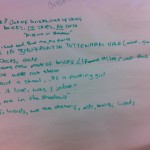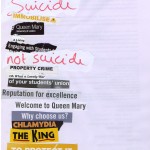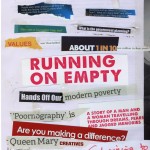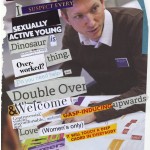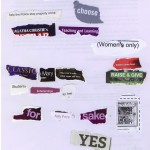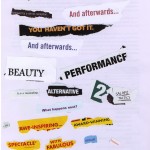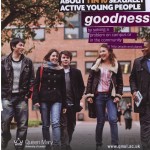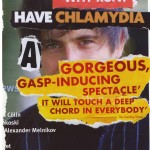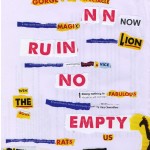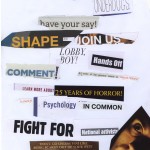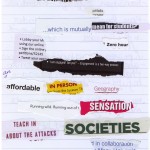Salomé Voegelin is an artist and writer engaged in listening and hearing as a socio-political practice of sound. She is the author of Listening to Noise and Silence: Towards a Philosophy of Sound Art (Continuum, 2010). Other recent writings include a chapter in the The Multisensory Museum Cross-Disciplinary Perspectives on Touch, Sound, Smell, Memory, and Space (Alta Mira Press, 2014), ‘Ethics of Listening’ in the Journal of Sonic Studies 2 (2012), and ‘Listening to the Stars’ in What Matters Now? (What Can’t You Hear?) (Noch Publishing, 2013). Her essay ‘Sonic Possible Worlds’ is part of the Sound Arts issue of Leonardo Music Journal 23 (December 2013), and her second book Sonic Possible Worlds: Hearing the Continuum of Sound will be published by Bloomsbury in June 2014. Voegelin is a Reader in Sound Arts at the London College of Communication, UAL. She has a PhD from Goldsmiths College, London University.
This interview was conducted by Lawrence Uziell-Hamilton in the anechoic chamber at UCL.
Listen to Salome’s recordings for the Archive here.
How did it feel performing your work in the anechoic chamber?
SV: It was really interesting, because when you come in, your first impression is not only that it’s an anechoic chamber but also that it’s quite a small room, and reading or talking to somebody in this intimate, airtight space, puts a very particular stress on how you read. Also knowing that there was a certain time limit affected my reading. So it was these pressures or limitations that I felt first and then settling in I started to really like the sound, the dryness of the sound – it wasn’t John Cage’s hyperbole about the nervous system that I could hear, it was much more simply a sense of airlessness and lack of space and the clippedness of sounds in extreme dryness that you don’t get anywhere else – it was very particular. And I think it made me read very particularly – I hope not too monotonously – but it certainly affects how one performs any writing, and I think it adds a layer of acute self-consciousness.
In that sense, does your sonic environment always influence your performance to some extent, and in what ways do different, louder environments affect you?
SV: I haven’t performed my own work very often. I write and then perform it in the editing process to myself. I read aloud to myself and that is a very important part of my editing process. But I’ve only recently really started to make the performance of my work more central to my practice, and performing my work I also start to write differently. I’ve noticed on a few occasions, at things like PolyPly, where I’ve been invited to read certain things aloud, that that creates a challenge to write something to be read aloud. So it’s like a cycle, where one process triggers another, and I find that extremely challenging and exciting. I found today very stimulating, because, well, firstly it is a privilege, obviously, to have your own work recorded, but also because you placed me in a very particular environment, within this anechoic chamber, for a very specific moment of time. This specificity made me rethink what the words I normally put on a page mean, and how they come from sounds, because my words come from [listening to] sound, so the way they are re-sounded in a public or shared space is, at this moment, a very interesting process for me.
Do you think of yourself as a poet? I know you’ve performed at events like PolyPly, and perhaps share some similarities in outlook with contemporary sound poets, so how do you find yourself relating to the world of poetry?
SV: I am intrigued by poetry, my current favourite is Edith Södergran, a Swedish-Finnish-Russian poet from the beginning of the twentieth century, but I’ve never thought of myself as a poet. I think of myself as a composer and writer, but I suppose you put those two things together and you compose words, and to an extent I think you become a poet. I think I’ve moved more into poetry since having opportunities to perform readings and taking my texts to spaces, so time-frames and rhythms become part of my writing. I do like more theoretical approaches to poetry too. For example I’m very fond of Julia Kristeva’s idea of a revolution in poetic language. The idea, not of poetry but of the poetic, I think, has always been in my composition and sonic practice as well as in my written practice, as an anarchic, as a phenomenological, experiential element. And although I have never described myself as a poet I like the processes and concepts of poetry to be within my work.
An extensive focus on sound in aesthetic practice is often considered inherently avant-garde or experimental. This seems to be particularly the case with poetry, thinking of Dada sound poets like Hugo Ball to contemporary figures in the Archive of the now like Caroline Bergvall or Holly Pester. Why do you think this is, given the very traditional understanding of poetry as an aural practice?
SV: What I’ve found in my own practice of working with sound and words is that we would probably be much happier if we accepted that 90% of the time we don’t understand each other and then there are these moments of coincidence, these exceptions when we do understand each other, and would try to work backwards:. starting with poetry, starting with what one may call experimental but what I would maybe rather call experiential, phenomenological, rather than semiotic words. Then people like the poets you mention, for example, would move more into the mainstream, not in a populist sense, but in the sense that we would have an access to them through our own sense of the inaccessibility of language, its misunderstandings. But I think this sort of engagement gets pushed to the side as something difficult, hence the terms avant-garde and experimental. I think there is something inherently difficult about poetry, particularly spoken poetry, something that people find icky. And I use the word ‘icky’ quite decidedly, because I think it’s almost bodily, using this daily material of words to rephrase them, reframe them, un-frame them, de-frame them, and then deform them, or reform them into something formless and difficult to grab hold of. I think people actually find it very uncomfortable and maybe that’s where its got something in common with what might be called experimental music – I would rather call it sound art – people’s self-consciousness is so great that they begin to feel physically uncomfortable and push works away and think ‘oh that’s avant-garde’.
The Archive of the Now is a database specifically for recordings of poetry. What do you think can be gained from the fact that this encourages close listening, as opposed to close reading?
SV: I think it’s really important, because when you listen to the Archive of the Now, you listen to somebody else’s voice, and these voices, these breaths, these mouths and tongues go straight into your ear, and obviously that can amplify the discomfort we might feel with these often nonsensical words. Whereas with poetry that’s written down, there is a visual distance, a detachment possible. There is a gap where you can feel not quite so physically and bodily involved. So I think its very exciting that it is recorded, it also means that the time we have to record, becomes the time of the listener also, and we start to share something; we start to share the same anxieties around time and bodies, and co-listening and listening alone. I think to throw people into the experience and make them listen and engage in the demands of the spoken, the sonic and the temporal is really very important.
Perhaps counter to that last question, then, I’m interested in the way you translate very ephemeral, subjective experiences of listening into writing. What happens in this process, and do you think anything is lost through it?
SV: What is lost, and what I would say is never there in my writing, is the moment of my listening, because listening is inherently ephemeral and passing. I think that is its strength, and is the intrigue of sound. Even if technologically repeatable, it is not experientially repeatable: every listening is this new moment, this new aesthetic moment of engagement, and this is exactly what I find so particular. There can’t even be the pretence of looking at it again, it is always looking at it anew, so the refrain becomes not again and again, but anew and anew. To write about sound might seem to pretend a holding on to, a framing or a stoppage, but it isn’t, because, while I appreciate that my moment of listening is gone, it opens up other moments of hearing: for the readers to hear their environments at the moment of reading, and to expand that consciousness to other moments, and so to experience the world in terms of temporary moments of listening. This sonic sensibility of course has to meet language, because otherwise it becomes very solipsistic. If we just said ‘listen to the moment’ in a meditative way, that can be interesting, but I am not solipsistic enough to feel satisfied by this. Instead I’m interested in creating points of access, portals, which we produce in language, and through which we can at least try to find moments of coincidence for exchange and communication.
Can you say more about the idea behind your ‘Soundwords’ blog?
SV: I started Soundwords after I’d finished Listening to Noise and Silence. Writing a book has its own temporal demands, it takes quite a long time to go through all the processes until it lives and can be read by other people. What fascinated me about writing a blog was that it was instantaneous; that I could have a sonic experience, and could try to grapple with words to make it tangible, accessible for other people, or rather to make their own moments of listening accessible to themselves. There was a seeming instantaneity about it, and the ease between my hearing and writing and your reading and listening is what fascinated me. I am still writing this blog now, four years on, maybe not as religiously and often as I’d like it to but it’s still a real moment of engagement because I also immediately imagine other listeners when I write, so it seems very reciprocal.
I get the feeling reading your book Listening to Noise and Silence that your phenomenological approach is often accessed in an unorthodox way, through a creative and poetic descriptive psychology. How do you feel your theoretical work relates to your creative practice?
SV: Maybe if I just quickly go through the first part of your question about the sort of psychological, phenomenological approach. I think as much as I feel that as an artist I can play with what composition is, and I can play with what poetry is – as I said previously, I’m an artist who sometimes does poetry, and who sometimes does different things. In the same way, there is a certain freedom for me to do philosophy, and use phenomenology, among other philosophical methods, in a slightly unorthodox way, maybe in an upside down way, in a useful way for me. And I think you’re quite right to point out that mine is a sort of psychological phenomenology, hence also my preference for Maurice Merleau-Ponty, whose phenomenology relates to psychology, rather than for example, Husserl, whose phenomenology was influenced by mathematics, a mathematical sense and rationality of perception, whereas for Merleau-Ponty there is nonsense, there is sensate sense, there is doubt and the uncontrollable, and I feel that really gives me the tools to write about sound. And here I come to the second part of your question about how my writing relates to my practice. My creative practice is a compositional practice, in that I compose sound works on my own and in collaboration, and I also see writing as part of this practice. And having these theoretical approaches that are, for me, open enough, but have a certain ground, I feel I can use them to be in communication without stifling the material expression of my work. Because there is of course a desire to communicate the heard, and so for me phenomenology, and, more recently logic has been very useful to theorise without arresting the process of making work.
Talking about logic, your forthcoming book is an approach to sound through the concept of possible worlds and set theory. Could you maybe explain what led you to this, and how it may be affecting your creative output?
SV: Yes, my next book is called Sonic Possible Worlds: Hearing the Continuum of Sound, and if I can plug it here, it’s going to come out in June this year (2014). My last book, Listening to Noise and Silence, ends with a chapter called Now that is all about the constant ‘now’ of sound, and about where this sonic now meets memory in present perception. And somehow, the whole book, it seems to me now, reflecting on it after its publication, is somehow about accessing an other layer of the world – the world built by Tarkovsky’s refrain and evoked through a Bergsonian sense of memory in sound. We listen out for sounds of cars, of loudspeakers, of announcements and of language, because obviously these sounds are vital signifiers, related to our daily lives and survival. But there are other signifiers, relationships and materialities, at least potentially accessible through a sonic sensibility, that could provide a whole other sense of the world. And that led me to use the idea of possible worlds in my next book, and sparked my intrigue with possible world theory. Within that philosophy there are some unorthodox characters, like David K. Lewis, for whom every world that is possible is an actual world for somebody. That sort of thought really comes together with my idea that, more often than not, we misunderstand each other and only in moments of coincidence do we understand each other that I mentioned earlier. Since your world is your actual world because it is possible for you, and there are some aspects of your world that are completely impossible for me, completely inaccessible to me and do not hold up for me. In turn there are some worlds that are possible for me only, like the way my actual world is possible for me because it’s accessible to me and I inhabit it. Lewis talks about how inhabiting the world is what makes it real to you, and of course, he still says so as a logician, where its not about the “really” real world, but about the world of language and thought. But through marrying his radical realist conception of possible worlds with Maurice Merleau-Ponty’s phenomenological lifeworlds, I come to possible lifeworlds and of course, I had already talked of sonic lifeworlds, and now they become sonic possible lifeworlds, and this opened up new possibilities about how we inhabit the soundscape, and how it becomes possible as an actuality and thus how other worlds, as other possibilities of this world, become accessible through sound also.
So on the one hand there is an aesthetic dialogue to be had about artworks and how we can access them through possible world theory married with phenomenology, but there are also real political and social implications in a conceptual sonic possible lifeworld. It makes accessible, as in thinkable, all the works, languages, people, cultures and traditions that are excluded from or at the margins of our so called ‘actual’ world, representing at best an inferior possibility. A sonic sensibility provides different access to those possibilities that we even sometimes declare as impossibilities, and that remain inaudible not because they do not sound but because for ideological, social or political or even aesthetic reasons we cannot hear them and thus we grant them no actuality. In this sense listening and sound, conceptual and actual, become tools to access the as yet inaudible, the possible impossible, to make the sounding but unheard take part in the configuration of actual reality.
